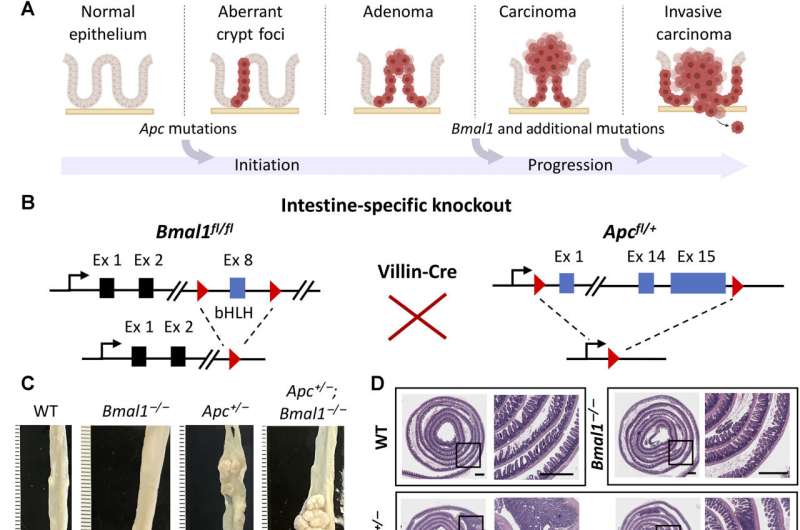New research reveals the circadian clock influences cell growth, metabolism and tumor progression

In a new University of California, Irvine-led study, researchers define how the circadian clock influences cell growth, metabolism and tumor progression. Their research also reveals how disruption of the circadian clock impacts genome stability and mutations that can further drive critical tumor-promoting pathways in the intestine.
The study, titled, “Disruption of the Circadian Clock drives Apc Loss of Heterozygosity to Accelerate Colorectal Cancer,” was published today in Science Advances.
In this study, researchers found that both genetic disruption and environmental disruption of the circadian clock contribute to the mutation of the adenomatous polyposis coli (APC) tumor suppressor, which is found in the vast majority of human colorectal cancers (CRC). APC point mutations, deletions, and loss of heterozygosity (LOH) events have been reported in approximately 80 percent of human CRC cases, and it is these mutations that drive the initiation of intestinal adenoma development.
“As a society, we are exposed to several environmental factors that influence our biological clock, including night shift work, extended light exposure, changes in sleep/wake cycles and altered feeding behavior,” said Selma Masri, Ph.D., assistant professor of biological chemistry at UCI School of Medicine. “Strikingly, we have seen an alarming increase in several young-onset cancers, including colorectal cancer. The underlying cause of this increased incidence of cancer in adults in their 20s and 30s remains undefined. However, based on our findings, we now believe that disruption of the circadian clock plays an important role.”
According to the National Institutes of Health, there has been an alarming rise in early-onset colorectal cancer among young individuals. Today, nearly 10 percent of CRC cases are now diagnosed in people younger than 50 years, and this trend is on a steady rise. Suspected risk factors include environmental aspects, such as lifestyle and dietary factors, which are known to affect the circadian clock.
APC mutations are also associated with second hits in key oncogenic pathways, including Kras, Braf, p53, and Smad4, and these mutations drive progression to adenocarcinoma, collectively contributing to disease progression. These findings now implicate circadian clock disruption in driving additional genomic mutations that are critical for accelerating colorectal cancer.
The circadian clock is an internal biological pacemaker that governs numerous physiological processes. Research in the Masri Lab is primarily focused on how disruption of the circadian clock is involved in the development and progression of certain cancer types. Researchers in the Masri Lab are actively pursuing further research aimed at defining how the circadian clock impacts other cancer types.
Sung Kook Chun et al, Disruption of the circadian clock drives Apc loss of heterozygosity to accelerate colorectal cancer, Science Advances (2022). DOI: 10.1126/sciadv.abo2389
Citation:
New research reveals the circadian clock influences cell growth, metabolism and tumor progression (2022, August 10)
retrieved 10 August 2022
from https://phys.org/news/2022-08-reveals-circadian-clock-cell-growth.html
This document is subject to copyright. Apart from any fair dealing for the purpose of private study or research, no
part may be reproduced without the written permission. The content is provided for information purposes only.
For all the latest Science News Click Here
For the latest news and updates, follow us on Google News.

